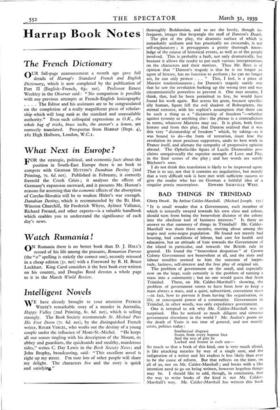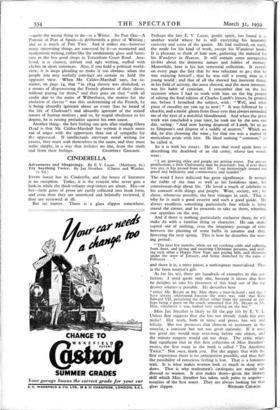BAD THINGS IN TRINIDAD
which is naturally swayed towards his own class and colour, should turn from being the benevolent dictator of the colony into the obedient tool of business interests." Is there an answer to that summary of things in Trinidad? Mr. Calder- Marshall was there three months, moving about among the negro and semi-negro population. He found not merely bad housing, bad conditions of labour, bad care for health and education, but an attitude of hate towards the Government of the island in particular, and towards the British rule in general. He found the " benevolent despotism " of Crown Colony Government not benevolent at all, and the riots and labour troubles seemed to him the outcome of inepti- tude, laziness, self-interest and the free play of original sin.
The problem of government on the small, and especially now on the large, scale certainly is the problem of turning a mass into a community ; but no one would guess that from Trinidad. There, on Mr. Calder-Marshall's showing, the problem of government seems to have been how to keep a mass always a mass, and a quiet, subservient, convenient mass —in fact, how to prevent it from having the organisation, or life, or consequent power of a community. Government in Trinidad, in other words, was only expediency government.
One is tempted to ask why Mr. Calder-Marshall was so surprised. Has he noticed so much diligent and virtuous government elsewhere in the world ? Mr. Auden's poem on the death of Yeats is too true of general, and not merely crisis, politics today : Intellectual disgrace Stares from every human face And the seas of pity lie
Locked and frozen in each eye— So much so that a book of this kind, one is very much afraid, is like attacking measles by way of a single spot, and the indignation of a writer and his readers is less likely than ever to be the cause of reform. But that reflects on the time, on all of us, not on Mr. Calder-Marshall ; and books with a like intention need to go on being written, however hopeless things may be. I should like to add, though, in conclusion, that the way to write books of the kind is not Mr. Calder- Marshall's way. Mr. Calder-Marshall has written this book
—quite the wrong thing to do—as a Writer. So Part One—A Portrait of Port of Spain—is deliberately a piece of Writing ; and so is much of Part Two. And it strikes me—however many interesting things are conveyed by it—as mannered and modernistic writing, rather like the modernistic glass and furni- ture in the less good shops in Tottenham Court Road. Ana- lysed, it is clumsy, irritant and ugly writing, stuffed with clichés in short sentences. Also, if you hold a political world- view, it is inept pleading to make it too obvious when the people you may usefully convince are certain to hold the opposite view. When Mr. Calder-Marshall says, for in- stance, on page 14, that "in 1834 slavery was abolished, as a means of dispossessing the French planters of their slaves, without paying for them," and then goes on that " with all credit due to the name of Wilberforce, the motive for the abolition of slavery " was this undermining of the French, be is being absurdly ignorant about an event (has he heard of the life of Clarkson?) and absurdly ignorant of the mixed nature of human motives ; and so, by stupid obedience to his dogma, he is raising prejudice against his own cause.
Another thing : the first feeling one gets after reading Glory DJad is that Mr. Calder-Marshall has written it much more out of anger with the oppressors than out of sympathy for the oppressed. If intellectuals interrupt novel writing for causes, they must soak themselves in the cause, and they must write simply, in a way that irritates no one, from the truth



































































 Previous page
Previous page